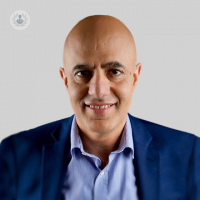Managing conflict: Expert insight on diffusing tension for effective communication
Written by:Navigating conflict in difficult relationships can be very challenging, particularly when tensions are high. From problems with colleagues at work to difficult relationships within families and conflicts in friendships or partnerships, diffusing tension and resolving issues with effective communication is a multi-faceted skill. We invited highly esteemed consultant psychiatrist Dr Sunil Raheja to share his expert insight on the key factors involved in conflict resolution and sound communication in challenging relationships.

How can I communicate effectively with someone who is difficult to get along with?
In difficult relationships, there are two sides to consider and when someone is not willing to engage with you, it’s very difficult to know what you can actually do to move forward. Having said that, you can make steps to create an environment that makes it more likely that the person will respond to your attempts to communicate. It’s well worth considering what you can do to change that atmosphere and make it more conducive to the other person beginning to open up and share what’s on their mind.
If the person in question is not willing to talk, it’s also important to be very patient and allow them to control the pace of the relationship. Considering the context that you are creating for the other person is key, as is allowing them to have appropriate time and space to process what is going on.
It may also be beneficial to consider the concept of an ‘emotional bank account’, where much like a normal bank account, you can make deposits and withdrawals. Deposits and withdrawals in an emotional bank account may relate to what has happened previously in the relationship. For instance, if there has been harshness, rudeness or very little interaction, or occasions when attempts to communicate have not gone well, you are likely to have a deficit in your emotional bank account. Therefore, considering how to raise this to a level where you can begin to communicate effectively is a key step.
Both yourself and the other person will likely have different goals and so expecting too much too quickly can also cause problems.
In some situations, people may find that difficult conversations can get very quickly heated or tense. In such cases, we have to consider how we can reach a point where both parties can agree to disagree and yet still maintain a relationship. This is a skill that is very much missing in our society and culture and is something that is well worth learning how to do.
How can I manage conflict and diffuse tension in a difficult relationship?
The challenge here is that when you are dealing with a subject that you both feel very passionately about and that can become very heated, it’s very easy to talk past each other and not listen. Both people in the conversation are perhaps raising their voices and are talking more angrily as the tension rises. When you carry on doing that, it’s unlikely to end well.
In these types of situations, the emotional part of the brain, the amygdala or limbic system, tends to take over and you can end up saying things which you later regret. If you feel that the conversation is getting out of control and there is a risk that either of you will say things you will later regret, it is much healthier to call a kind of ‘time-out’.
This is where the ability to agree to disagree while still maintaining a relationship comes into play. If you think it’s appropriate, getting a third party involved can also be helpful. Alternatively, going away to cooly reflect on what the other person is saying may help you to look at the issue from the other person’s perspective. Considering why they may be saying what they are saying and where your own ideas and comments come from can help to deescalate and allow you to put yourself in the other person’s shoes.
This makes a good start in resolving issues but of course, this depends on the context of the problem and factors including how long the conflict has been going on.
You can read more of Dr Raheja’s expert insight on managing challenges in relationships, including addressing underlying issues and asserting boundaries, in his other detailed article on the topic.
If you are having difficulty managing conflict in your relationship and would like to schedule a consultation with Dr Raheja, you can do so by visiting his Top Doctors profile.


